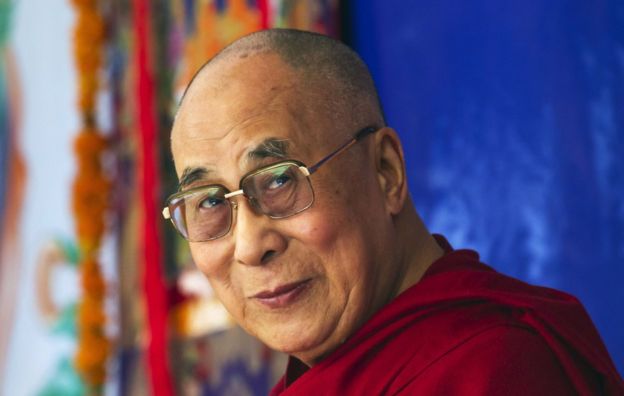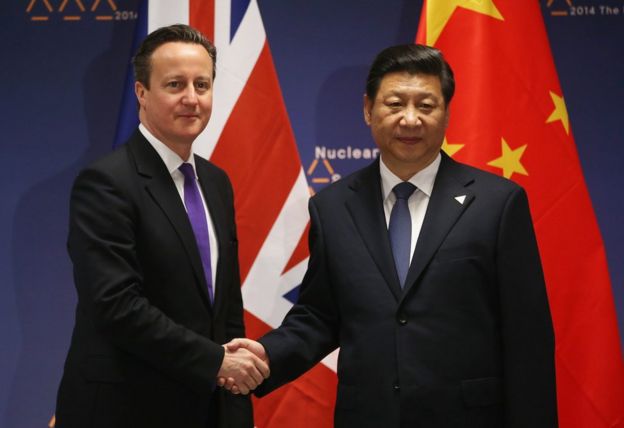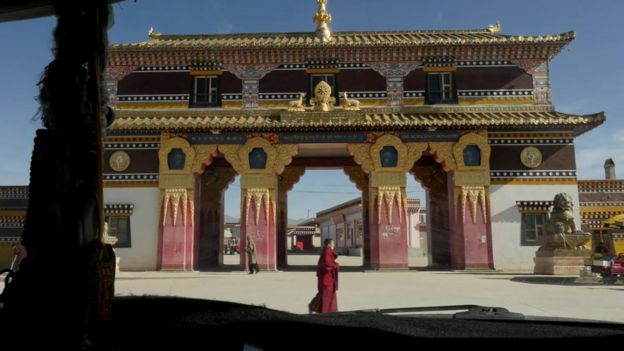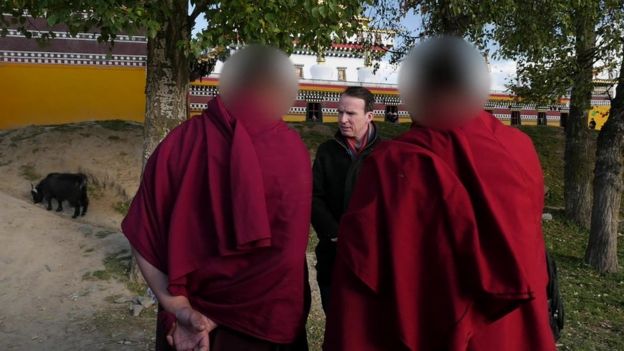-
20 October 2015
- From the sectionChina
Media caption Inside Tibet: John Sudworth visits Aba to see what people there make of Britain’s strengthening ties with China
The first thing that strikes you about the monasteries clinging to the side of the mountains on the edge of the Tibetan Plateau is their beauty.
Small, isolated communities of a few hundred monks, seemingly unperturbed with their white and gold stupas and prayer flags set against the almost impossible blue sky.
But anyone who stops to ask a few questions (although they are the kind of questions the busloads of Chinese tourists will never ask) notices something else too.
Fear.
We are winding our way up the long road from the central city of Chengdu to the Aba Tibetan region in north-west Sichuan Province.
Seen as part of “greater Tibet” by exile groups, it is an area that lies just outside the borders of the Tibetan Autonomous Region and so, in theory at least, foreign journalists do not need special permission to be here.
But many a reporter has been turned away in the past and we are moving quickly, trying not to linger too long in any place.
With the gantries bristling with video cameras it is clear that a careful watch is being kept on these monasteries.
So the introductions need to be brief and the questions direct. But we find that many monks, despite the risks, are keen to talk – although not on camera.
 Image copyrightAP
Image copyrightAP“What do you think of the Dalai Lama?” I ask one elderly monk.
His response is typical; a hesitation, a glance round, and then, in hushed tones: “He is always close to our hearts.”
“Is it dangerous to talk about him?”
“It is, it is,” he replies. “I’d be taken away like this,” and he gestures by crossing his hands to show me where the handcuffs would go.
He speaks of his resentment over the restrictions on his religious freedom, about how – despite reports that China has been relaxing the penalties for carrying or displaying portraits of the exiled Tibetan spiritual leader – they have to worship him in secret.
And then he bends down and briefly kisses my translator’s hand. “I’ve been here for 20 years and I’ve never spoken to a foreigner,” he says.
“These things have been burning inside of me, just to say it is enough.”
 Image copyrightGetty Images
Image copyrightGetty ImagesThese are sentiments we hear repeated time and again.
A Chinese state visit to Britain might not seem like an obvious premise for a reporting trip to this country’s remote Tibetan regions.
With President Xi Jinping 8,000km (4,970 miles) away and talking of common ground and closer economic ties, his officials would likely see our attempt to gather testimony here as the usual foreign media mischief-making.
But while the tight control of coverage of Tibet domestically is nothing new, we wanted to ask Tibetans what they thought of Beijing’s recent efforts to keep it off the diplomatic agenda too, the shadow of which looms large over the pomp and ceremony in London.
The deep displeasure over the British Prime Minister David Cameron’s May 2012 meeting with the Dalai Lama, a man China considers a dangerous separatist, was made abundantly clear.
UK-China relations were only put back on track after a great deal of fence-mending, bridge-building, and a statement from the PM’s office that he had no plans to meet the Dalai Lama again.
He has so far kept his word on that promise, and many critics see a dangerous precedent in Britain’s readiness to allow the Chinese Communist Party to demand a foreign policy price in exchange for economic grace and favour.

We eventually pass unnoticed through the checkpoints on the edge of Aba County, some 10 hours drive from Chengdu, and reach our ultimate destination, Kirti Monastery.
One of the most important centres in Tibetan Buddhism, Kirti has also been at the centre of one of the biggest challenges to Chinese authority in decades.
The Tibet-wide rioting of 2008 began here, and many of the more than 140 gruesome self-immolations have taken place in or around Aba.
The recent one-man protests, with monks carrying portraits of the Dalai Lama through the centre of Aba along what they now call “Heroes Street”, have been met with a heavy response.
The punishment for such defiance can be up to four years in prison.
During our visit, the whole town of Aba was undergoing one of its periodic internet blackouts – completely cut off since early last month – and the monks told us that people had been taken away for simply forwarding prayers and messages from the Dalai Lama.
China has long been trying in vain to force people here to turn their backs on their spiritual leader.
So what do they think of the attempts to force foreign governments to do the same?
Remarkably, in a quiet corner, outside the monastery walls and at great risk to themselves, some of the monks agree to talk to us on camera, providing we disguise their identities.

“The Dalai Lama is the biggest living Buddha for all Tibetans, and he is the only master in our heart,” one of them tells me.
“He is like the sun to us,” another adds. “All the Tibetan people think the same.”
“When China tells foreign governments not to meet him, should they listen?” I ask.
“They should meet him,” the monks insist.
And then that fear again, palpable and real.
“If the government knows [we’re talking to you] they’ll arrest us. It happened before.”
“Some of us tried to contact reporters overseas online and talk about the Chinese government’s control over Tibet. As soon as the government finds out, they’ll make the arrest.”
After just a few short minutes, they melt away.
There’s so much more I’d like to ask them but, fleeting as it is, it is at least real testimony, real voices from one of the most closed and controlled places on the planet.
And it is proof that 50 years in exile have done nothing to diminish the Dalai Lama’s popularity and authority here.
It is that popularity perhaps that lies at the heart of China’s continual preoccupation with a man who has spent over five decades in exile, and why it tries so hard to limit his influence on the global stage.
The more foreign governments comply, critics say, the more the human rights abuses here slip from international view – and the more isolated Tibet’s fearful monks become.




 Print
Print Email
Email